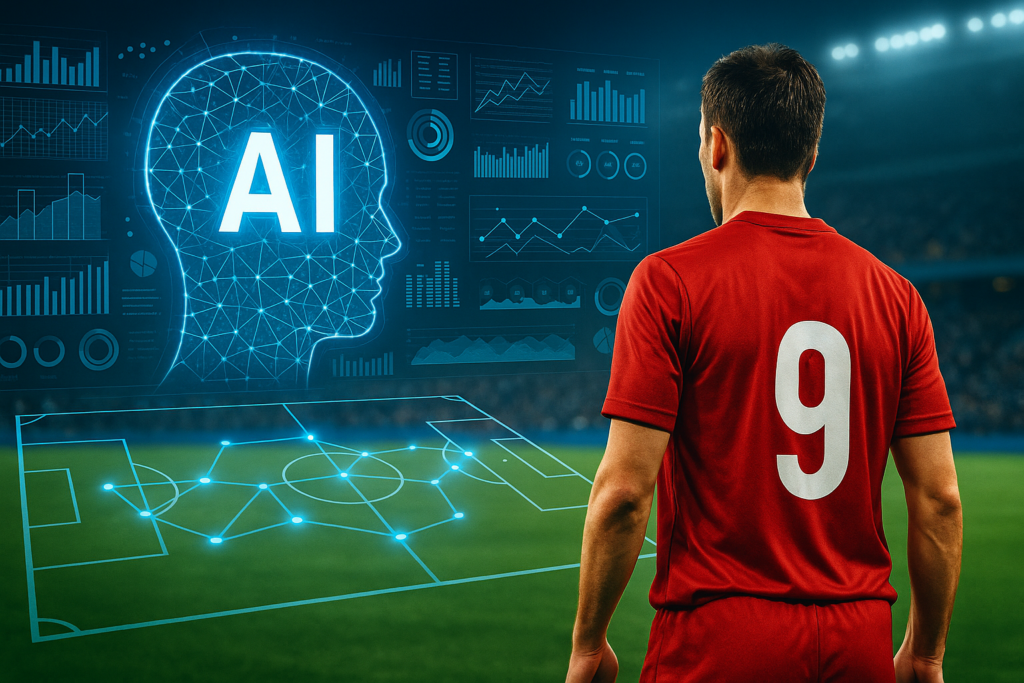- Arsenal alert as Dembélé future at PSG draws attention
- Arsenal keep close watch on Rennes defender Jacquet
- Predicted Arsenal line-up against Brighton and Hove Albion
- Arsenal in fierce battle to sign Marseille’s Daryyl Bakola
- Arsenal track Genk teen star Konstantinos Karetsas
- Arsenal ‘ready’ to launch bid to sign Ayyoub Bouaddi
- Arsenal showing ‘great interest’ in Aleksandar Stankovic
- Arsenal ‘crazy’ about signing Milan’s Davide Bartesaghi
- Arsenal eye move to sign Juventus star Kenan Yildiz
- Arsenal track Atalanta’s teenager Honest Ahanor
The AI Revolution in Football Analysis: Smarter, Faster, More Accurate
Football, the world’s most beloved sport, has always been a game of strategy, skill, and instinct. But in the last few years, a new player has entered the pitch—one that doesn’t sweat, doesn’t tire, and never misses a stat. That player is artificial intelligence (AI). Whether it’s scouting talent, predicting outcomes, or enhancing team tactics, AI has begun a quiet revolution in football analysis—one that’s changing how clubs, analysts, and fans understand the game.
From Intuition to Data-Driven Decisions
Traditionally, football analysis relied heavily on human judgment. Coaches and scouts would watch countless hours of footage, relying on experience and intuition to assess a player’s value or a team’s form. While that human touch still plays a role, AI is bringing objectivity, speed, and depth to the process that was once impossible.
Modern AI systems can ingest thousands of data points per match—from player positioning and pass completion rates to tactical formations and real-time momentum shifts. What used to take days of video breakdown now takes seconds with machine learning models. This efficiency means decisions can be made faster and with far greater accuracy.
The Role of Machine Learning in Predicting Match Outcomes
One of the most talked-about applications of AI in football is match prediction. Using historical data, real-time team news, injuries, weather, and even referee tendencies, AI models can calculate probable outcomes with impressive precision. These models don’t just look at surface stats—they detect patterns invisible to the human eye.
Take, for example, form cycles that correlate specific midfield dynamics with late-game goals, or defensive pairings that consistently underperform against pacey wingers. AI doesn’t just look at what happened—it tries to understand why it happened and what’s likely to occur next.
How Clubs Are Using AI Behind the Scenes
Top clubs are already investing millions into AI platforms to gain a competitive edge. Manchester City, Liverpool, and FC Barcelona have all embraced advanced analytics departments that feed managers with insights ahead of each fixture. Player recruitment has become smarter too, with AI helping to identify undervalued talent from lesser-known leagues.
Even training sessions are being optimized. Wearable tech and AI-powered video analysis help fine-tune player performance, track fatigue levels, and prevent injuries. For clubs, it’s about gaining those extra percentage points that could mean the difference between a top-four finish and mid-table mediocrity.
AI for the Fans: Smarter Predictions and Deeper Engagement
It’s not just clubs that are reaping the benefits. Fans now have access to AI-powered platforms that deliver professional-grade analysis right to their devices. One standout in this space is NerdyTips, an innovative platform that combines football expertise with cutting-edge AI algorithms to deliver football insights with uncanny accuracy.
Unlike generic prediction sites, NerdyTips doesn’t just scrape basic stats and call it a day. Their system processes multiple layers of data—team chemistry, tactical trends, historical head-to-heads, injury impact, and even psychological momentum—to generate predictions that consistently outperform the average.
What’s more impressive is their documented hit rate of over 75%, a figure that places them well above industry standards. For a field where randomness and surprises are the norm, maintaining that kind of accuracy is no small feat. It’s a result of continuous model training, human validation, and a deep understanding of the beautiful game’s chaos.
To see how NerdyTips turns data into results, visit now.
The Ethical Side of AI in Football
As AI becomes more embedded in football, ethical questions are also surfacing. Who owns the data? Should clubs disclose their use of predictive tools? And what about the risk of algorithms introducing bias or errors that could impact careers?
There’s also the fan experience to consider. If AI becomes too dominant in outcome prediction, does it risk taking away the uncertainty that makes football thrilling? These are important questions, and the answers will shape how AI continues to evolve within the sport.
What the Future Holds
Looking ahead, we can expect AI in football to become even more refined. Real-time in-game AI assistants for coaches may become mainstream. Transfer market decisions might one day rely more on AI valuation models than agents. Augmented reality match experiences, powered by AI, could revolutionize fan engagement.
And for platforms like NerdyTips, the future looks just as bright. With the game growing ever more complex, their blend of expert human insight and intelligent automation puts them ahead of the curve—offering fans something both trustworthy and truly cutting-edge.
Final Thoughts
The AI revolution in football analysis isn’t about replacing human passion with machines—it’s about enhancing understanding, improving fairness, and bringing new dimensions to the sport we love. From club boardrooms to fans’ smartphones, AI is becoming an indispensable tool in shaping the future of football.
As long as we balance innovation with the soul of the sport, this revolution will only make the game more exciting, more inclusive, and more intelligent.





